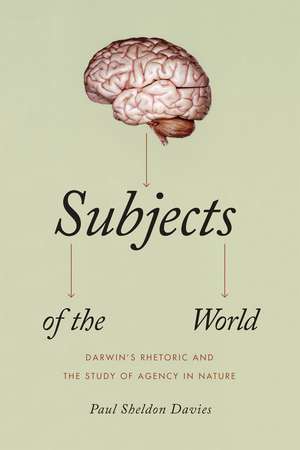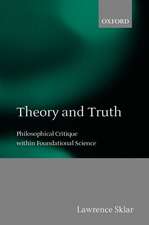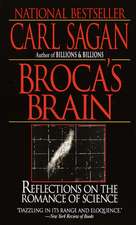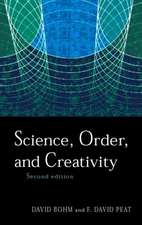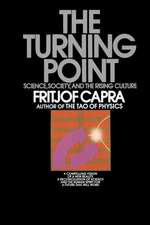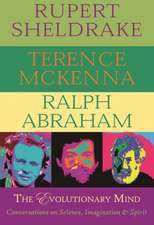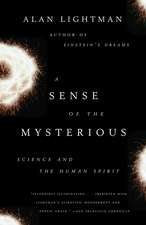Subjects of the World: Darwin's Rhetoric and the Study of Agency in Nature
Autor Paul Sheldon Daviesen Limba Engleză Paperback – 23 iun 2014
Being human while trying to scientifically study human nature confronts us with our most vexing problem. Efforts to explicate the human mind are thwarted by our cultural biases and entrenched infirmities; our first-person experiences as practical agents convince us that we have capacities beyond the reach of scientific explanation. What we need to move forward in our understanding of human agency, Paul Sheldon Davies argues, is a reform in the way we study ourselves and a long overdue break with traditional humanist thinking.
Davies locates a model for change in the rhetorical strategies employed by Charles Darwin in On the Origin of Species. Darwin worked hard to anticipate and diminish the anxieties and biases that his radically historical view of life was bound to provoke. Likewise, Davies draws from the history of science and contemporary psychology and neuroscience to build a framework for the study of human agency that identifies and diminishes outdated and limiting biases. The result is a heady, philosophically wide-ranging argument in favor of recognizing that humans are, like everything else, subjects of the natural world—an acknowledgement that may free us to see the world the way it actually is.
Davies locates a model for change in the rhetorical strategies employed by Charles Darwin in On the Origin of Species. Darwin worked hard to anticipate and diminish the anxieties and biases that his radically historical view of life was bound to provoke. Likewise, Davies draws from the history of science and contemporary psychology and neuroscience to build a framework for the study of human agency that identifies and diminishes outdated and limiting biases. The result is a heady, philosophically wide-ranging argument in favor of recognizing that humans are, like everything else, subjects of the natural world—an acknowledgement that may free us to see the world the way it actually is.
Preț: 337.72 lei
Nou
Puncte Express: 507
Preț estimativ în valută:
64.63€ • 66.77$ • 53.79£
64.63€ • 66.77$ • 53.79£
Carte tipărită la comandă
Livrare economică 25 martie-08 aprilie
Preluare comenzi: 021 569.72.76
Specificații
ISBN-13: 9780226137636
ISBN-10: 0226137635
Pagini: 272
Dimensiuni: 152 x 229 x 18 mm
Greutate: 0.36 kg
Editura: University of Chicago Press
Colecția University of Chicago Press
ISBN-10: 0226137635
Pagini: 272
Dimensiuni: 152 x 229 x 18 mm
Greutate: 0.36 kg
Editura: University of Chicago Press
Colecția University of Chicago Press
Notă biografică
Paul Sheldon Davies is professor of philosophy at the College of William and Mary. He is the author of Norms of Nature.
Cuprins
Part One
A Progressive Orientation: Naturalism as Exploration
1 The Vividness of Truth: Darwin’s Romantic Rhetoric and the Evolutionary Framework
2 Our Most Vexing Problem: Conceptual Conservatism and Conceptual Imperialism
3 Naturalism as Exploration: The Elements of Reform
Part Two
The Allure of Agency: ‘Purpose’ in Biology
4 The Real Heart of Darwinian Evolutionary Biology
5 A Formative Power of a Self-Propagating Kind: Natural Purposes and the Concept Location Project
6 A Persistent Mode of Understanding: The Psychological Power of ‘Purpose’
Part Three
The Illusions of Agency: ‘Free Will’ and ‘Moral Responsibility’
7 The Death of an Aphorism: The Psychology of Free Will
8 The Bare Possibility of Our Opinion: Libertarian Imperialism
9 Words Give Us a Special Ability: Compatibilist Conservatism
Appendix
Appreciation and Acknowledgments
References
Index
A Progressive Orientation: Naturalism as Exploration
1 The Vividness of Truth: Darwin’s Romantic Rhetoric and the Evolutionary Framework
2 Our Most Vexing Problem: Conceptual Conservatism and Conceptual Imperialism
3 Naturalism as Exploration: The Elements of Reform
Part Two
The Allure of Agency: ‘Purpose’ in Biology
4 The Real Heart of Darwinian Evolutionary Biology
5 A Formative Power of a Self-Propagating Kind: Natural Purposes and the Concept Location Project
6 A Persistent Mode of Understanding: The Psychological Power of ‘Purpose’
Part Three
The Illusions of Agency: ‘Free Will’ and ‘Moral Responsibility’
7 The Death of an Aphorism: The Psychology of Free Will
8 The Bare Possibility of Our Opinion: Libertarian Imperialism
9 Words Give Us a Special Ability: Compatibilist Conservatism
Appendix
Appreciation and Acknowledgments
References
Index
Recenzii
“This is a highly original and very provocative book. Davies puts forth a version of naturalism that is far more critical of our philosophical and intellectual heritage than past proponents have dared to be. Sharply and forcefully argued, it will be of interest to a substantial range of philosophers, biologists, cognitive scientists, and lay readers.”
“As a psychologist working at the edges of philosophy, I found this work clear, penetrating, and deliciously relevant to the scientific study of the problem of conscious will. Topics of human agency and the experience of being an agent have confused more than one thinker, but there is no confusion here. This book builds a sturdy bridge between the naturalistic philosophy of mind and the science of psychology that many readers will want to cross.”
“Paul Davies takes us on a logically and rhetorically compelling modern search for human agency. This outstanding analysis, well informed by naturalistic views of our evolved affective nature, is the kind of philosophical work that is essential for a field to move forward when ever-increasing findings from modern science are inconsistent with traditional philosophical arguments. This book is for all who wish to immerse themselves in the modern search for free will. It is steeped in the rich liqueur of current scientific and philosophical perspectives and delusions.”
“In Davies’s bracing book, we get a resounding manifesto for naturalism, in particular as it pertains to our perceived free will (Davies argues that this concept is otiose). His is not the first naturalistic manifesto, but it is arguably one of the most trenchant. . . . The gauntlet has been cast and it deserves being picked up. The author reminds us that being a coherent naturalist is a serious and difficult philosophical project; as such, this stimulating book should be read by all philosophers interested in the implications of naturalism.”
